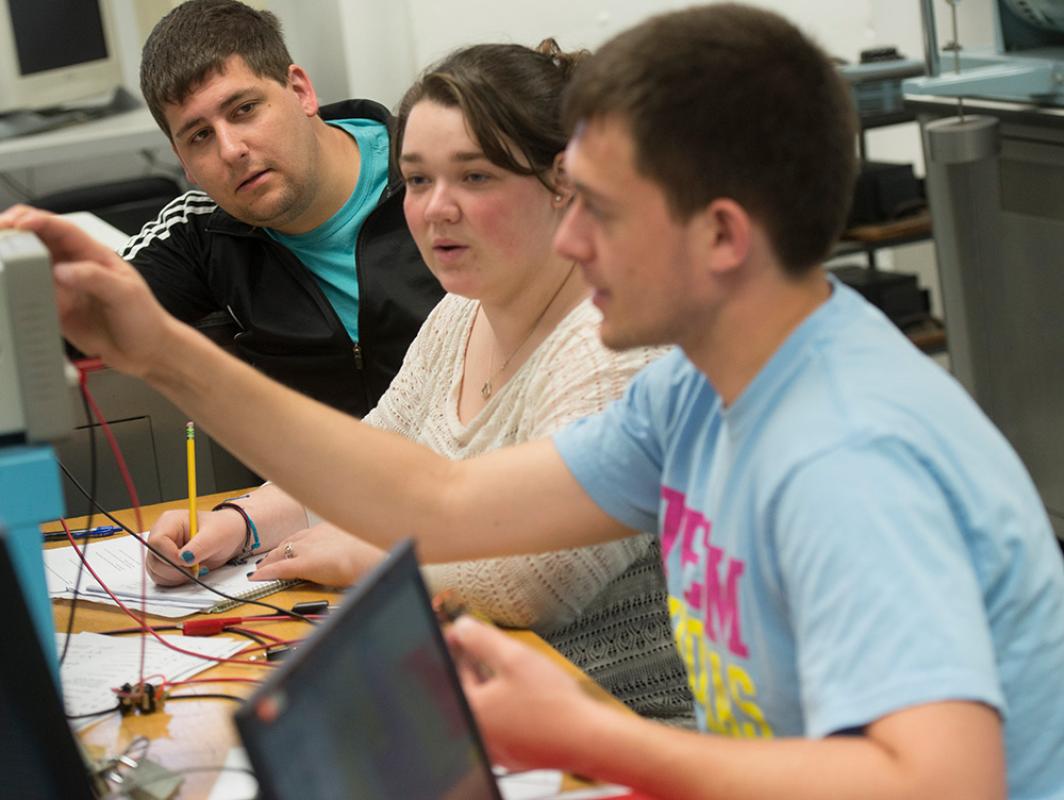
Today’s electrical engineers are problem solvers on the forefront of change. Our Master of Science in Electrical Engineering will provide you with the skills and knowledge you need to advance your career in today’s competitive job market. Gain valuable, hands-on experience designing, developing and building electrical systems and electronics. Get advanced training in robotics, embedded processors, renewable energy, power, Internet of Things, semiconductors, electrical circuits and more. Three concentrations to choose from or design a concentration to meet your needs and interests. Full- and part-time options available.
-
This degree program can be completed part-time or full-time.
Flexible and Convenient Program
The Master of Science in Electrical Engineering is designed to help you balance work, school and family.
Accelerated 4+1 Master’s
Open to current Wentworth students in the final year of their Bachelor of Science in Electrical Engineering or Civil Engineering, the accelerated 4+1 master’s degree enables you to enroll in master’s-level classes while completing your bachelor’s degree Choose the thesis or non-thesis option and complete your degree just 1 year after graduation.
Full-Time Option
Open to candidates with a BS in Electrical Engineering and or related major, who are not able to transfer the required graduates-level credits into the program. Choose the thesis or non-thesis option and complete your degree in just 3 semesters.
Part-time Option
Open to working professionals with a BS in Electrical Engineering or related major, the part-time program can be completed in as little as 2 years, or up to 4 years, depending on the availability of transfer credits and the thesis/non-thesis option chosen. Convenient afternoon and evening classes allow you to continue working while you learn and apply what you are studying to work-related situations.
-
Wentworth Institute of Technology is accredited by the New England Commission of Higher Education (formerly the Commission on Institutions of Higher Education of the New England Association of Schools and Colleges, Inc.).
-
Electrical Engineers in the World
Job Titles
Top Job Titles for Master’s in Electrical Engineering (2020)
- Software Engineers
- Design Engineers (Architecture and Engineering)
- Senior Electrical Engineers
- Systems Engineers (Computer and Mathematical)
- Systems Engineers (Architecture and Engineering)
Skills
Top Skills Requested of Master’s-level applicants In Electrical Engineering (2020)
- Electrical Engineering
- Computer Engineering
- C++ (Programming Language)
- Internet Of Things (IoT)
- Software Engineering
Salary
- Median annual salary, MS Electrical Engineering, $130,000.
-
View more information about program requirements in the Course Catalog below.
The program has a thesis option with 31 required credit hours, and a non-thesis option with 34 required credit hours. Either option has the students undertake an individualized engineering development experience, either as a two-course Thesis, or a one-course Master Project. All students are required to complete a one-credit Professional Perspectives course to increase exposure to recent developments and to aspects of professionalism. All students are required to complete a three-course concentration, either one of the predefined concentrations or an individualized concentration. The course requirements to complete the MSEE. degree are shown in this curriculum table. Students must complete the course requirements with a cumulative GPA of at least 3.0, following Wentworth graduate school policies.
Thesis Option
Course List Course Title Credits Mathematics Requirement MATH5800 MATHEMATICAL METHODS 3 or ELEC5850 ENGINEERING NUMERICAL METHODS 3 Management Requirement MGMT7175 ENGINEERING INNOVATION & ENTREPRENEURSHIP 3 or MGMT7100 PROJECT MANAGEMENT APPLICATIONS 3 Professional Perspectives Requirement ENGR7101 PROFESSIONAL PERSPECTIVES 1 Graduate Concentration Electives Requirement Graduate Electives: 6 three credit courses 18 ELEC 5000 or 6000 Level courses or other gradute courses with advisor's permission. THESIS OPTION ENGR7100 THESIS I 3 ENGR7200 THESIS II 3 TOTAL CREDITS 31 Non-Thesis Option
Course List Course Title Credits Mathematics Requirement MATH5800 MATHEMATICAL METHODS 3 or ELEC5850 ENGINEERING NUMERICAL METHODS 3 Management Requirement MGMT7175 ENGINEERING INNOVATION & ENTREPRENEURSHIP (or) 3 or MGMT7100 PROJECT MANAGEMENT APPLICATIONS 3 Professional Perspective Requirement ENGR7101 PROFESSIONAL PERSPECTIVES Project Requirement ENGR7000 MASTER PROJECT 3 Graduate Concentration Electives Requirement Graduate Electives: 8 three-credit courses 24 ELEC 5000 or 6000 Level courses or other gradute courses with advisor's permission. TOTAL CREDITS 34 For students with unrelated undergraduate degree, the following foundation courses may be required or recommended. ELEC5550 DIGITAL SIGNAL PROCESSING (3 credits) ELEC5520 FOUNDATIONS IN SIGNALS AND SYSTEMS (3 credits) DATA6000 APPLIED STATISTICS FOR RESEARCH (3 credits)
Concentrations
The program offers three structured concentrations and one individualized concentration. A student is required to complete one concentration. To fulfill a concentration, the student is required to:
- Complete three of the courses listed with the concentration.
- Complete a thesis or master project that relates to a field of the concentration.
A student may take more than three of the listed courses for the concentration, and any completed extra courses would be counted as electives. A student may attempt to complete two concentrations. The student would need to complete three unique courses per concentration (no course could be counted as one of the three courses for both concentrations). The thesis or master project would need to be related to a field of both concentrations. The concentrations and associated courses are listed below. ELEC courses at the 5000 level do not have a graduate-level prerequisite. ELEC courses at the 6000 level may have a graduate-level prerequisite.
Course List Course Title Credits POWER AND ENERGY CONCENTRATION ELEC5825 ELECTRICAL BUILDING SYSTEMS 3 ELEC5560 POWER SYSTEMS ANALYSIS I 3 ELEC5660 POWER SYSTEMS ANALYSIS II 3 ELEC6125 RENEWABLE ENERGY INTEGRATION 3 Course List Course Title Credits ROBOTICS AND PROCESS AUTOMATION CONCENTRATION ELEC5700 ROBOTICS & AUTOMATION SYSTEMS 3 ELEC5725 MACHINE PERCEPTION & COGNITION 3 ELEC5750 INDUSTRIAL CONTROLS 3 ELEC6200 CYBER-PHYSICAL SYSTEMS 3 Course List Course Title Credits ELECTORMAGNETICS AND MICROWAVE SENSING CONCENTRATION ELEC5900 INTRODUCTION TO RADAR SYSTEMS 3 ELEC5925 INTRODUCTION TO MICROWAVE IMAGING 3 ELEC5950 ANTENNA THEORY 3 ELEC6300 MICROWAVE ENGINEERING 3 Course List Course Title Credits INDIVIDUALIZED CONCENTRATION Students who wish to pursue an Individualized Concentration may submit a proposal to the graduate committee of the program for review. The proposal would include a rational, the name of the concentration and the required courses.


